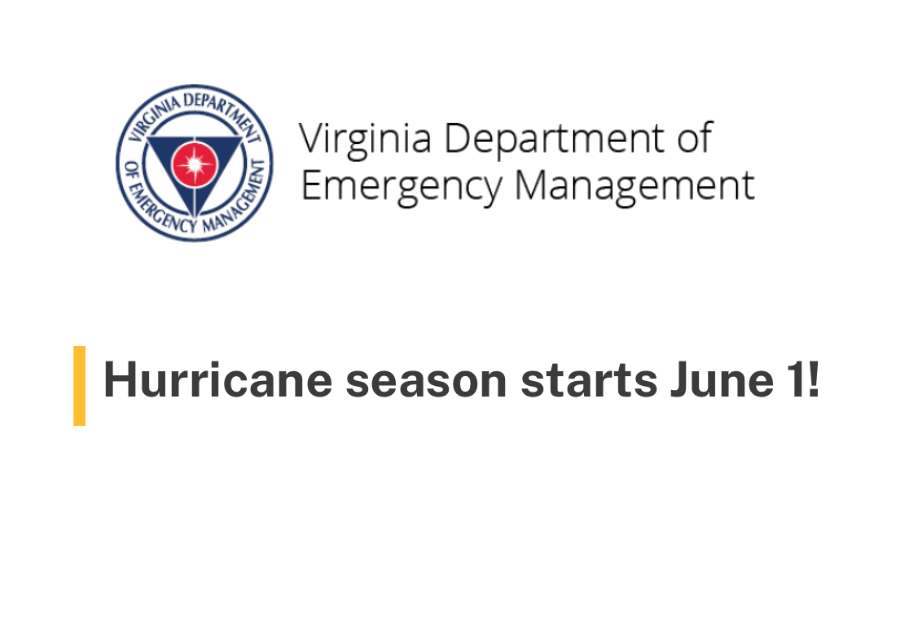With hurricane season just around the corner, the State Corporation Commission’s (SCC) Bureau of Insurance (Bureau) reminds Virginians that the time to plan is now. Planning includes reviewing your insurance policy and making sure you have the coverage you need if a hurricane or other disaster strikes.
The Atlantic hurricane season runs from June 1 through November 30 each year. Once a hurricane develops in the Atlantic, it may be difficult to find an insurance company willing to write hurricane-related coverage for your home, auto or business until after the storm threat passes.
“Protect yourself, not only physically, but financially,” said Virginia Insurance Commissioner Scott A. White. “Hurricanes can wreak havoc on your property. Review your insurance policies and know what is and is not covered. If you have questions, contact your insurance agency or company or the Bureau of Insurance.”
Even areas hundreds of miles from the coast can experience floods and other damage caused by hurricanes’ high winds and torrential rains. Most hurricane damage is caused by flooding, not high winds. Even minor floods can cause extensive damage to your home, vehicle, business or belongings.
The Bureau offers the following reminders as Virginians prepare for hurricane season:
- Homeowners, renters and commercial insurance policies issued in Virginia typically do not cover damages caused by floods, surface water or storm surges. The federal government sells insurance for direct flood and flood-related damage to homeowners, renters and businesses in eligible communities through the National Flood Insurance Program (NFIP). Keep in mind that there is typically a 30-day waiting period for a new flood insurance policy to take effect. To learn more about this program, contact your insurance agent or the NFIP at 1-800-427-4661 or visit floodsmart.gov.
- Some private insurers also offer flood policies, so check with your insurance agent about the availability of a private flood insurance policy.
Flood coverage available through the NFIP may differ from private flood coverage, so it’s important to understand the differences. No matter which option you consider, ask whether your flood policy covers your personal property.
- Some homeowners policies require a special deductible for wind or hurricane losses. These deductibles may be applied separately from any other deductible on the homeowners policy. Deductibles may, for example, be written as a flat amount, such as $1,000, or may be applied to the loss as a percentage of the insurance coverage limit on the dwelling. Remember that the deductible is the amount that you must pay before the insurance company pays its portion of a claim.
- Don’t wait to prepare a home inventory of your personal property, which should include photographs, videos and serial numbers. Having a home inventory can facilitate the claims process if damage occurs. The National Association of Insurance Commissioners’ free home inventory app – available through the App Store and Google Play – can make creating a home inventory easy. Keep your insurance policies and home inventory together in a safe and secure place.
- Know what to do if your property is damaged by a hurricane. Contact your insurance agent or company as soon as possible. Make any necessary emergency repairs and take reasonable steps to prevent further damage to your property. Additionally, make a list of all damage to your property and include photographs, notes and repair-related receipts.
- If you must evacuate, know the name of your insurance company and take your homeowners, auto and other insurance policies and your home inventory with you, or make sure you can access these important documents electronically. The policies will contain your policy numbers and the phone numbers of your insurance companies in case you have questions or need to file a claim.
The Bureau of Insurance offers free consumer guides for homeowners and commercial property owners with information about what to do when a disaster strikes. These and many other consumer insurance guides are available at scc.virginia.gov/pages/Insurance. The Bureau’s specially trained staff can assist consumers with their insurance-related questions and concerns. To learn more, contact the Consumer Services Section of the Bureau’s Property and Casualty Division toll-free at 1-877-310-6560 or in Richmond at 804-371-9185.
For additional emergency preparedness information regarding hurricanes and other types of disasters and hazards, visit vaemergency.gov.



